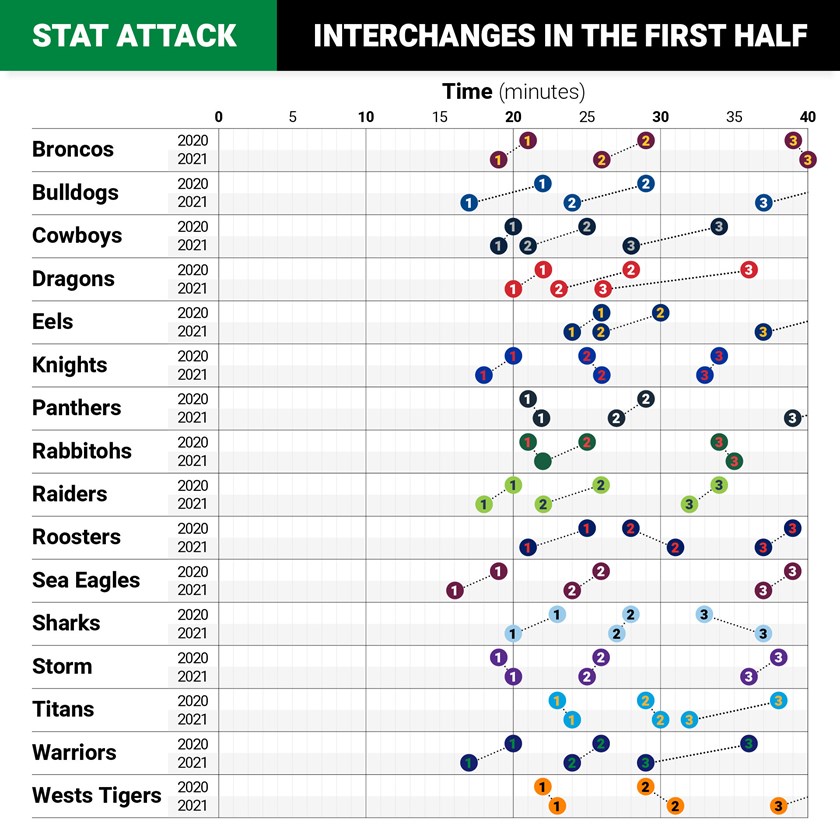With the new rules speeding up play in 2021, coaches have responded by making their first few interchanges earlier than they did last year.
After six rounds of the 2021 season, an NRL.com Stats analysis shows there are 11 clubs making their first interchange earlier in games on average, some by a significant margin, while five clubs are making their first change fractionally later.
There is an even bigger disparity in the third interchange, with four clubs in 2020 regularly holding the third change back until the second halves of games but every club this year has used their third change on average before half-time.
Across 2020 the average time of a first interchange across 16 clubs was around 21.5 minutes but in the six rounds of the 2021 Telstra Premiership, that has dropped to 20 minutes.
Early injuries have been a factor in some clubs heading to the bench sooner than last year but across the board there has still been a significant decrease in the average time coaches look to their interchange at a few clubs.
The biggest drop has come at Canterbury under new coach Trent Barrett, with one of Ofahiki Ogden or Dylan Napa frequently interchanged at around 17 minutes as the club went from an average 22nd-minute first sub to five minutes less this year.

That average has been brought slightly lower by the early Lachlan Lewis HIA in round four but even without that, the Bulldogs had the biggest drop in average first interchange time.
The earliest average first interchange this year has been at Manly, who have dropped from 19 minutes to 16.
Without the fourth-minute ACL injury to Andrew Davey last month they would have been close to steady at around 19 minutes (although this would still make them one of the earliest users of the interchange this year).
The Roosters (25 minutes down to 21) have had a couple of injuries too, with Sitili Tupouniua in the 13th minute in round four and Freddy Lussick after 17 minutes in round five, but they have still made their first interchange every week sooner than the 25th minute they averaged in 2020.
The Broncos, Raiders, Sharks, Knights, Warriors, Cowboys, Eels and Dragons are making their first change two to four minutes earlier on average than last year.
Parra, in dropping from 26 minutes last year to 24 this year, maintain their record as the latest club to look to the bench.
The Panthers (21 up to 22 minutes), Storm (19 to 20 minutes) Rabbitohs (21 to 22), Titans (34 to 24) and Wests Tigers (22 to 23) are each averaging one minute later this year.
That pushes the Titans up to equal-latest this year along with the Eels, with Titans coach Justin Holbrook trusting his starting middles to stay out for longer periods.
When it comes to change number three, the average has dropped from 38 minutes to just over 34.
It looks like you may be using adblocking software to view this site.
Many features on the site, such as video playback, may not work properly when using adblocking software.
Please whitelist our domain or disable your adblocker to access all features and videos.
The season so far: The first six rounds
The Dragons have favoured effectively a triple-change, making their third change at around 25 minutes compared to 36 minutes last year. The Titans (38 to 32) aren't far off that either while the Bulldogs (42 to 37), Warriors (36 to 29), Cowboys (34 to 28), Eels (42 to 37) and Panthers (44 to 39) have also made big drops.
While many clubs have seen their fair share of injuries early in games this year, that alone does not account for this increased use of early interchanges as coaches seek to counter the increased fatigue caused by fewer stoppages in games.
There has been far less of a shift in interchanges four through eight as coaches continue to keep a change or two up their sleeve to cover for late-game injuries, suggesting bench players (or starters who can stay on for longer minutes) are becoming increasingly important in the new-look competition.
Be part of the NRL action on Anzac Day as the game does its bit to honour Australia and New Zealand’s military forces. Tickets at NRL.com/Tickets















